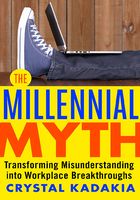
CHAPTER 1 Rebuilding the Backdrop for Millennials
Nothing is more damaging to a new truth than an old error.
—Johann Wolfgang von Goethe
Today’s new truth is that millennials are indeed bringing positive changes to the workplace and society at large. Unfortunately, over the last decade, errors have been made in shaping the perception of this generation. As a result, the biggest danger facing the millennial generation and their potential for success is what today’s dominant population, boomers and Xers, think of them.
As an example, consider an experience I had after leading a powerful panel discussion about millennials. Many audience members of older generations shared how much my message resonated with them and how they felt a new sense of clarity about millennials. However, a corporate vice president in the audience pulled me aside and said, “But really, Crystal, at the end of the day, all millennials want is money, just like everyone else. Especially when they grow up.” Having just explored my own story of pursuing potential during the panel, as well as the unconventional stories of five other millennials on stage (who were all grown ups!), I was a bit taken aback. I asked, “Sir, have you talked to many millennials?” He responded, “My kids are millennials and yeah they want the new car, the new clothes, and the mansion.” I thought for a moment before responding, “Well, sir, those are the kids you raised. Those aren’t all the kids out there. There might even be more to your own kids than you realize.”
He laughed in response and I smiled, but the conversation clearly gave him something to think about. He had bought into the stereotypical perception of the millennial generation. Consider the lens this vice president was wearing every time he looked at members of the youngest generation. How many excuses and explanations did he make to justify the exceptions he encountered among the millennial generation? How often did he refuse to make a change to create modern culture in the workplace because he felt he would be pandering to the younger generation?
In comparison, a boomer I work closely with has had a lifelong philosophy to always stay connected to “the new,” the latest changes going on. One way she does this is by making sure to work with younger people. After a successful career in research and development and later training, she has retired and yet, she purposefully pursues keeping fresh. Our relationship is one where I learn from her and she learns from me, an interdependent and most importantly (in her words) fun relationship. She is one to experiment with and embrace new approaches. How has having this lens created opportunities for her that would otherwise have been absent? What does her ability to build relationships across generations look like? How does looking beyond the biases represented in media help her create an objective, strategic approach?
Many leaders stubbornly cling to an “it’s always been done this way” mentality and, even if they want to, have limited tools to discover what modernizing means because media paints millennials as impossible overgrown children who have now joined the workplace. The tools are limited to what works at organizations thought of as sexy by millennials: Google, Amazon, Facebook, start-ups. Often, these tools simply don’t make sense for other industries. As a result, the millennial generation is seen as an enormous challenge, something to be managed, to be taught, to be contended with, and ultimately, to be integrated into how we have always done things. Yet there are two sides to every story.